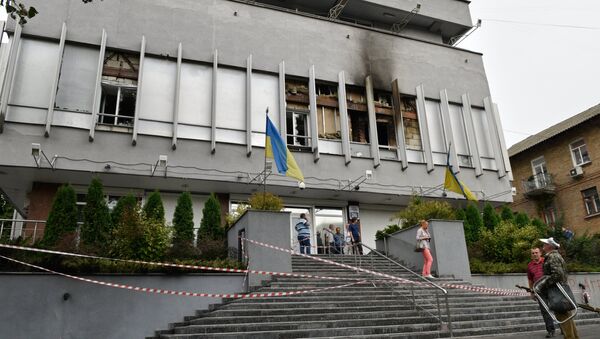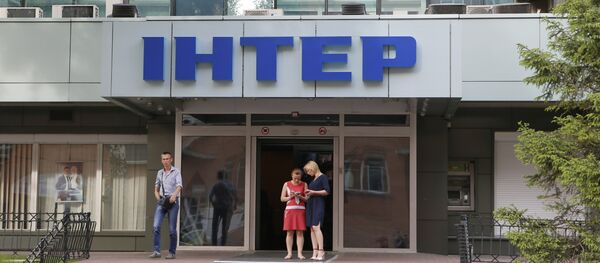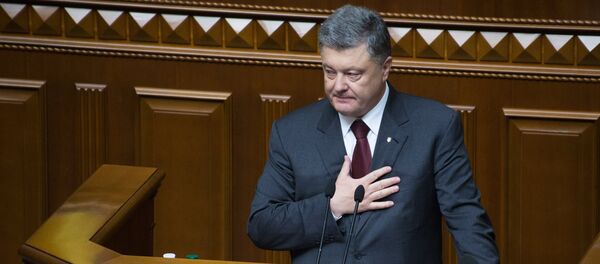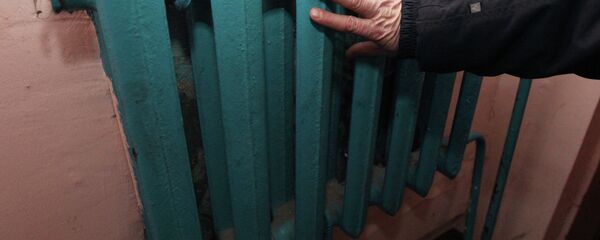According to the broadcaster, about 15-20 men wearing military fatigues and balaclavas attacked the building and set it ablaze on Sunday afternoon at around 4:30 pm.
A statement released on the network's website complained that "police were conspicuously absent in the area surrounding the building at the time of the attack."
Commenting on the attack on his Facebook page, Inter journalist Roman Bochkala compared it to the tragedy which shook the southern Ukrainian port city of Odessa on May 2, 2014. In those events, close to fifty anti-Maidan activists lost their lives, most of them burned alive inside the House of Trade Unions building, which nationalist radicals blocked off and set ablaze.
"In each case," Bochkala recalled, "a building was firebombed using Molotov cocktails, setting fire to the inside and sowing panic." In the case of the Inter attack, "thugs ran in in respirators in groups. Neutralizing security guards, they spread around the building shouting 'fire'. They poured kerosene on the floor in front of deathly frightened people, most of them women. Young mothers."
Despite simplistic claims by some Western mainstream media, including The Guardian, that Inter is a 'pro-Russian' channel, the reality, according to independent online newspaper Svobodnaya Pressa, is much more complicated.
Factually, the paper noted, "it would be difficult to call Inter TV an opposition network. Its coverage is consistent with the 'party line', that is, with the nationalist discourse in Ukraine. However, the channel is associated with the disgraced oligarch Dmitri Firtash, and Sergei Lyovochkin, the former head of the Yanukovych administration; for this reason, an information campaign has been carried out against it for a long time."
"In February 2016, the chief editor of Inter, Russian citizen Maria Stolyarova, thinking she was off the air, used foul language to describe the 'heavenly hundred'" (protesters who were killed, mostly by mysterious snipers, during the events leading up to the Maidan coup d'état in February 2014). "A scandal erupted, and even her dismissal did not save the channel from the 'patriots' wrath."
Then, as recently as last Wednesday, Interior Minister Arsen Avakov called on the Ukrainian Security Service to deal with Inter's 'treasonous' editorial style. Accordingly, Svobodnaya Pressa noted, it's not surprising that many Ukrainian political scientists have since suggested that persons from Avakov's People's Front Party may have been the masterminds behind Sunday's attack.
Commenting on the events, and their similarity to the events that shook his hometown in May 2014, Odessa journalist Yuri Tkachev told Svobodnaya Pressa that the attack on Inter was the logical outcome of the impunity granted to those responsible for the House of Trade Unions tragedy.
"In my opinion, these events have the same logic," Tkachev noted. "I would not be at all surprised if those involved in the attack on Inter were involved in the attack on the House of Trade Unions. They acted this way in Odessa and got away with it. So logically, these people have come to believe that if possible, something like this can and should be repeated, and nobody will do anything to punish them. We see that the attackers have already been released without charges. So this is a logical course of events; one follows from the other."
Moreover, the journalist recalled that "we have already heard Avakov's advisors talking about whether perhaps Inter actually set themselves on fire. It's unlikely that authorities will change their course of action. And the radicals will just be convinced that such behavior is acceptable, and similar incidents will be sure to take place, in more severe forms, in the future."
For his part, Igor Dmitriev, a political scientist and former member of the Odessa City Council, emphasized that the attack on Inter was nothing more than a continuation of the battle between Ukraine's political clans, each of which controls various media resources to influence the public and distribute financial resources among themselves.
Inter is widely expected to support alternative parties, including the Opposition Bloc, during elections. Accordingly, the journalist noted, "the People's Front may have decided to batten down the hatches and use their militia to close down this influential channel…" In any case, Dmitriev emphasized, "one shouldn't think that the armed 'activists' in balaclavas acted independently. In recent years, they have neatly lined up behind various clans" vying for political and economic power over the country.





